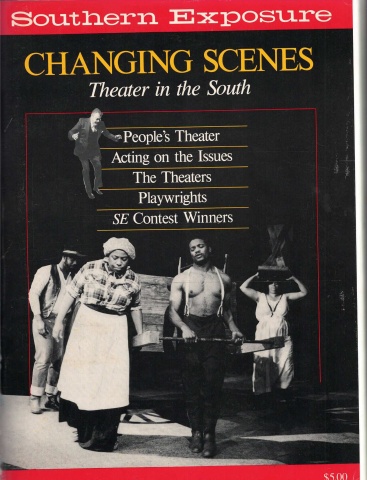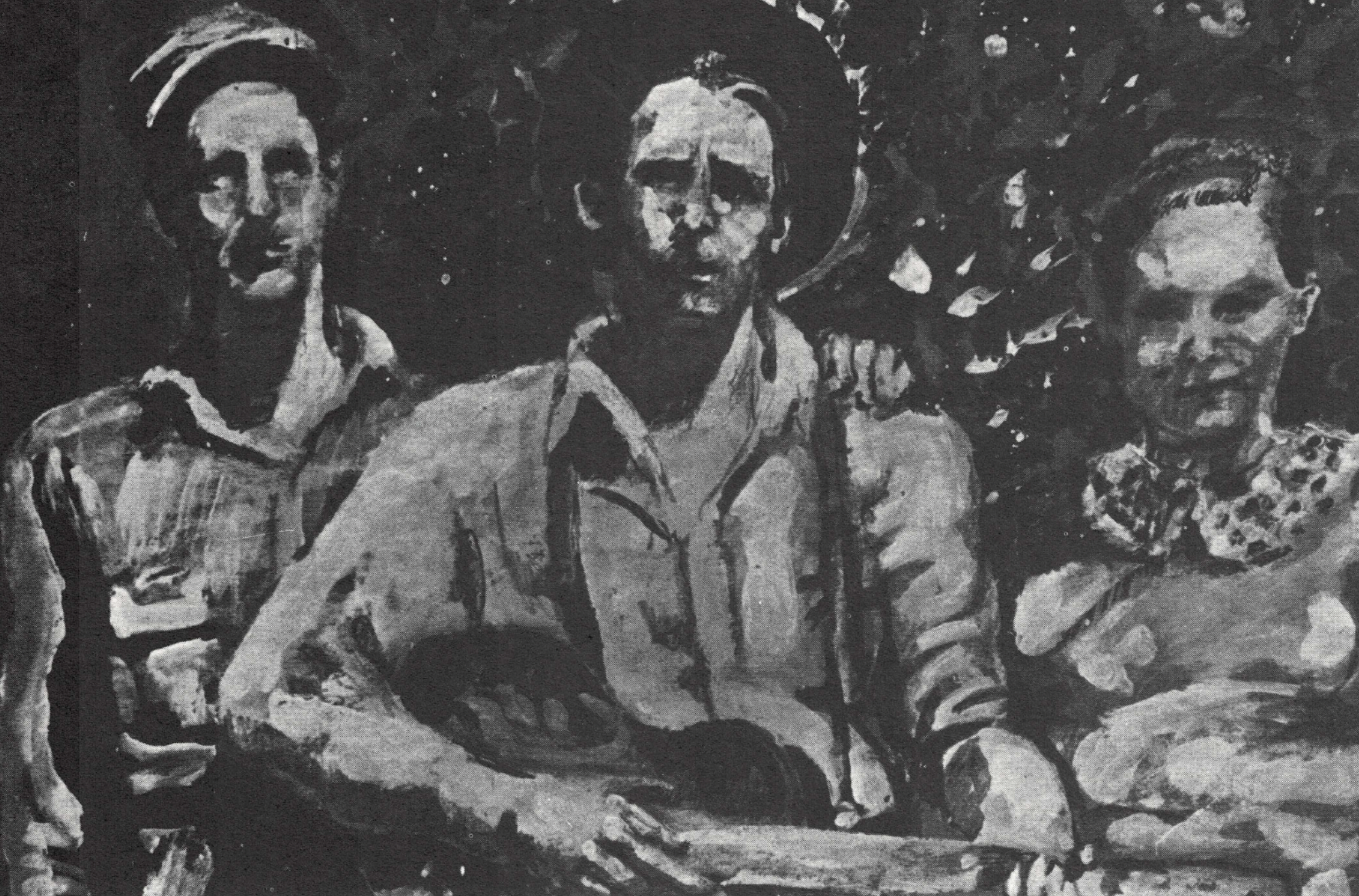
This article originally appeared in Southern Exposure Vol. 14 No. 3/4, "Changing Scenes: Theater in the South." Find more from that issue here.
"This place makes a body think, and if you listen real close, it can help you find the answers . . . In Ya' Blood."
The place: the Appalachian Mountains. The voice: an old man. The lines are from a play written by high school students in Whitesburg, Kentucky who are among a growing corps of young people awakened to the beauty and pathos of their heritage by the playwrights and storytellers of Roadside Theater.
In Ya' Blood, in turn, is a by-product of Roadside's parent organization, Appalshop, a nonprofit media group which includes Appalshop Films, June Appal Recordings, "Headwaters" television show, and WMMT-FM Radio in Whitesburg.
In 1969, Appalshop received a federal grant to teach filmmaking to minority young people (in the late '60s Appalachian youth were considered a minority) — a job-training program which was to be an instrument of economic and social change. One of Appalshop's first students made the film In Ya' Blood which was the inspiration for the students who wrote the play fifteen years later, in 1984.
From the Appalshop base, Roadside got its start in 1974, dedicated to producing theater by and about the people of Southern Appalachia. The new theater company faced some tough audiences: Appalachian school children still confused about who they were and what the future held in store for them. The Roadside storytellers started out telling the stories of Appalachia to the children of Appalachia, many of whom no longer heard the yarns at their parents' knees.
Jack — the well-known hero of many mountain tales — has the quick wits and good fortune to triumph over any adversity, despite the poverty of his circumstances. For the performers — who grew up under the stigma of being from Appalachia themselves — the tales of Jack's exploits gave them a vehicle for showing children that being from the mountains is a source of pride rather than a shameful heritage.
Roadside members learned taletelling from the masters they found around them: country preachers, aunts and uncles, farmers and fiddlers — anyone, in short, who had the time. In performance, they evolved a technique of improvisation, of breaking into another's story, of expanding on ripe details, and of doubling voices. They didn't just simulate some "hillbilly" reality: the tales improved with the telling. That experience, coupled with the egalitarian belief that their talent and success were within the reach of anyone, has kept Roadside Theater working in the schools and in its Appalachian community.
In 1985, 70 percent of Roadside's performances and workshops played to school children; yet school work accounted for only 25 percent of that year's earned income. To keep the theater financially stable the performers must spend a good deal of time on the road. Roadside regularly takes its shows to Atlanta, New York, Washington, and San Francisco. Currently there are four full-length plays touring with eight actors performing in various combinations. Roadside averages 200 performances a year.
Despite the necessity of performing in the flatlands, Roadside draws its artistic nourishment from the hills. Dudley Cocke, director of the troupe, admits, "We couldn't do this theater living in, say, New York. After a while we'd lose touch with the day-to-day reality here that we need to anchor our work."
The network of grants which keeps many U.S. artists crisscrossing the continent like medieval vagabonds helps Roadside maintain its contact with schools across the country and in its home region. It has worked with Indian settlements out West, in predominantly black communities in North and South Carolina, in northern Alabama, and in Virginia's coastal communities.
Wherever they are, Roadside members refuse to rely on the typical "15-minute song and dance" workshop for children. Instead, an educational program has evolved that fits the company philosophically by involving everyone in the company — playwrights, directors, and performers — and that suits the communities they visit as well. The workshops and the performances share a common goal: discovery. Roadside performer Ron Short explains that Roadside doesn't bring along a list of skills the student must master. "We say, 'This is something you can do. Now together let's figure out how.'"
''We are attracted to communities that, like ours, are struggling in some way," says Cocke. "Part of Roadside's message is, 'Look to your local culture and to your heritage to help figure out
who you are. Then figure out who and what is causing your problems. Having clarified the problem, search for the solution in a way that gives you hope of solving those problems.' Sounds simple, but in our experience it is very hard to do.''
Another goal of Roadside's educational thrust, according to Cocke, is "to help raise another generation of storytellers.'' A prestigious Ongoing Ensembles grant of $60,000 from the National Endowment for the Arts will enable Roadside to develop new plays, playwrights, and storytellers during the next five years. (Roadside received one of only eight awards made under the first year of this grant program, and it was the only rural theater to receive one).
While most Roadside members are either approaching or in their 40s, younger faces are being added to the company. Jeff Hawkins, administrator, developing actor, and playwright, is 25. In 1978 when Hawkins graduated from Fleming-Neon High School near Whitesburg, coal markets were booming and employment was close to an all-time high. Today unemployment is officially 22 percent and many believe the real figure to be closer to 50 percent. Hawkins can count perhaps 15 of his 75 classmates who still live in the area. Like so many of Appalachia's brightest, Hawkins left the region for college, but unlike the majority, he returned. That decision influences much of his work in the schools.
Seeing the need for drama in the school system, Hawkins initiated the first Whitesburg High School drama class, with help from a local English teacher. In Ya' Blood, the first student production, deals directly with the decision to stay behind — or the dilemma of being left behind — that all the kids in the region face.
Hawkins limited his role in In Ya' Blood to an advisory one, avoiding any effort to turn the production into his own or to have it mirror the more polished work of Roadside. He met with the students daily, joined from time to time by other company members. "The first scenes they wrote were really little TV sitcoms," says Hawkins. "I figured then that we better try to find something that mattered more to the kids.''
The issue of their future and the future of the mountains evolved after careful questioning by Hawkins. Despite a certain flatness in the characterizations, the play has an admirable reality: these aren't just retooled Beverly Hillbillies or Dukes of Hazzard. The young characters lug around their ever-present boomboxes, mimic comics from TV, and crumple beer cans, but they also listen to their elders and the old stories and songs. This is an Appalachia not of bare feet and moonshine, but of satellite dishes, mobile homes, and a desire to find a way in the 1980s.
The play has a powerful effect on its audiences, both young and old. Many parents remembered the dilemma the play poses all too well, and were moved to see their children dealing with
the problem 20 years later.
Working in Whitesburg as a Kentucky Arts Council artist-in-residence gave Hawkins the opportunity to nurture his students as they developed as writers and performers. The following year, Hawkins' class developed an original play, Gift of Choice.
Though closer to Roadside's work — an old woman, her brother, and their tales predominate — the kids work an interesting variation. The old woman's listeners are her grandchildren from Cleveland; they are hearing these stories for the first time and seeing the hills as outsiders. They hear her brother Caleb's lament, "It's the place that brings you back. . . . Somebody who's really from here could live anywhere else and they'd still want to be here, as bad as it is."
Hawkins is a cautious teacher, encouraging the students to work up the material on their own. He told student Robert Engle, who played the grandfather in In Ya' Blood, to "watch the old folks. Take notes. See how they hold their hands."
Roadside's caution and care produce enduring results, whether of a strong, unsentimental characterization by a high school student or of a theater company with surprising long-range goals. The NEA grant will enable Roadside to continue its own educational efforts and to maintain a connection with its cultural and historical training — the older storytellers, musicians, and the churches.
Roadside will "continue to work with young audiences and in educational settings, trying to find different ways to do that," maintains Cocke. "It would be a mistake to think we've got it all figured out. We as a community, and as a region, face tremendous problems. Our work welcomes those who face similar difficulties. Working with kids is one of the most optimistic places that we know to meet such a challenge."
Once thought of as hippies — albeit local hippies — Appalshop and Roadside now hold a more responsible position in the community. The two have become major local employers and cultural resources. In choosing to stay behind, Roadside has found a measure of unity, strength, and even light.
In one of Roadside's productions, an ensemble sings, warning of the dangers of Mammon:
You can lose your very soul
Living in the Cities of Gold. . .
Won't you listen to the music. . .
They're the songs of fathers and mothers
Aren't you glad they're still here.
And in In Ya' Blood an old man says, "I believe that these trees understand me and they listen better than most people. You probably think I'm a crazy ole coot, talking to trees and all, but I think that the spirit of this place is alive, and more real than we'll ever know."
Tags
Nancy Carpenter
Nancy Carpenter and Jeff Davis are writers living in Lexington, Kentucky. (1986)
Jeff Davis
Nancy Carpenter and Jeff Davis are writers living in Lexington, Kentucky. (1986)

